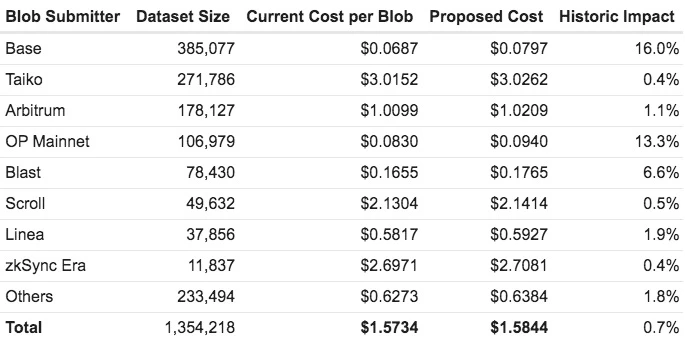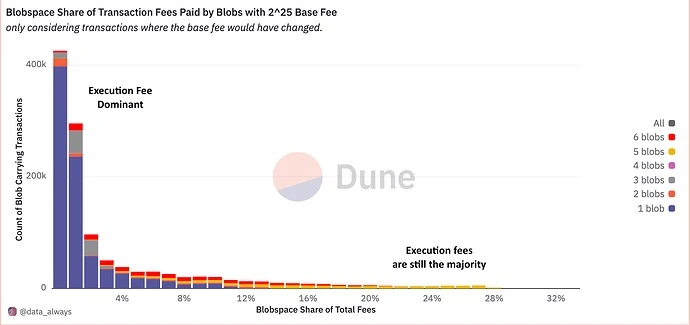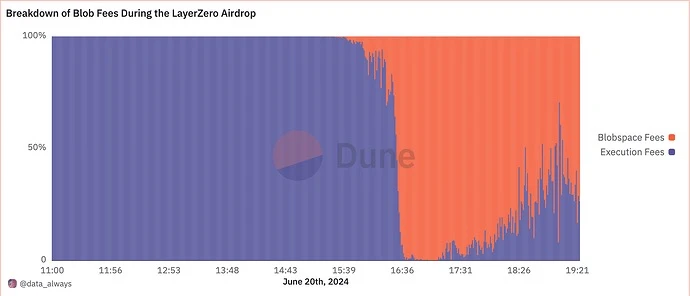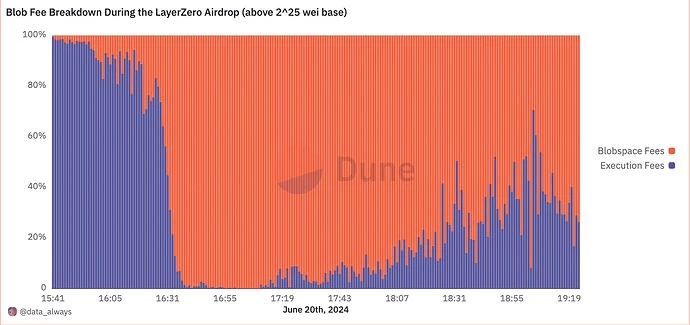Author: Data Always - Flashbots Research
Translation: Odaily Planet Daily
Flashbots Research researcher Data Always published an article, demonstrating whether raising the minimum base fee of Blob will affect the existing L2 or related transaction costs. The article summary is as follows:
- The proposal to set the minimum price of Blobspace has sparked controversy in the community, partly due to misunderstandings about how Blob finds paths on the chain. Although it is currently believed that Blob's contribution to the protocol is zero, this view is only valid when analyzing Blobspace fees.
- Transactions carried by Blob still need to pay the mainnet Gas fee, and during periods of high demand, the impact of Gas priority auctions makes L2 transaction pricing more complex.
- This article demonstrates whether raising the minimum base fee of Blob can alleviate the mismatch between price and demand.
- Overall, this adjustment has a limited impact on transaction costs, especially for efficient Blob submitters, the fee increase is minimal.
The original text is as follows.
When the blobspace fee market is dominated by execution fees, blob submitters who publish less execution data (mainly on the OP Stack chain) benefit. It also complicates the block building process: historically, many algorithms have determined Blob inclusion based on the priority fee for each gas, but due to the significant differences in mainnet gas usage for these transactions, it forces L2s that submit higher quality proofs to pay higher rates for the majority. Larger transactions further amplify the advantage of submitting less execution data. By approaching an environment dominated by blobspace fees, we will weaken this advantage.
Impact of the Minimum Fee
Based on the current price of ETH, Max's original proposal set the minimum fee for each blob at $0.05. By supplementing the execution cost with this new minimum fee, the proposal would increase the average cost per blob by 2%.
The revised proposal reduces the minimum base fee for blobs to 2^25, about one-fifth of the original proposal value, which is $0.01 per blob. Starting from early July, this means an average cost increase of 0.7% per blob, but due to the differences in financial efficiency among blob submitters, the percentage change is not uniform across different entities.
Revising the earlier transaction fee analysis to consider the 2^25 wei minimum base fee for blobspace, and only considering transactions where the original blobspace base fee is lower than the proposed new minimum fee, we see that while the fee structure is significantly changing, the blob base fee still remains a small component of all affected Blob-carrying transactions. Efficient transactions submitted by Base and OP Mainnet (carrying five blobs) will see a 10% to 30% increase in fees based on L1 gas prices, which should be easily absorbed. Less efficient transactions, especially those carrying one to three blobs, will see an increase of less than 10%.

Table: Blob submission statistics divided by entity from July 1, 2024, to September 17, 2024, assuming an ETH price of $2,500.
Revising the earlier transaction breakdown to consider the 2^25 wei minimum base fee for blobspace, and only considering transactions where the original blobspace base fee is lower than the proposed new minimum fee, we see that while the fee structure is significantly changing, the Blob base fee still remains a small component of all affected Blob-carrying transactions. Efficient transactions submitted by Base and OP Mainnet (carrying five blobs) will see a 10% to 30% increase in fees based on L1 gas prices, which should be easily absorbed. Less efficient transactions, especially those carrying one to three blobs, will see an increase of less than 10%.
So far, the 2^25 minimum Blob base fee has not accounted for the majority of the costs in Blob-carrying transactions.

Blobspace Response Time
Under EIP-4844, the maximum block-to-block update for the blobspace base fee is 12.5%. Starting from 1 wei, it takes 148 maximum capacity blocks, over 29 minutes (with a 12-second block time), for the base fee to rise above 2^25 wei. This update cycle has been defined as the protocol's response time, but it still only represents the shortest amount of time. Due to market inefficiency, blocks are not fully loaded with blobs, significantly extending the time for price discovery.
Before the LayerZero airdrop on June 20, the base blob fee was at the minimum value of 1 wei. During peak periods, the base blob fee reached 7471 gwei (equivalent to $3,450 per blob). Although theoretically it could reach this height in 51 minutes, the actual increase took nearly six hours. Under Max's proposal, this theoretical peak could be reached in 21 minutes, but clearly these theoretical values are not accurate.
The goal of the proposal is to set the minimum Blob base fee close to the inflection point where blobspace fees begin to occupy a measurable share of the total cost, rather than focusing solely on time. On June 20, despite the increase in the number of Blobs after 11:00 UTC, it wasn't until 15:17 UTC that blobspace fees began to account for 0.1% of the total fees paid by Blobs, and it wasn't until 15:41 UTC that it exceeded the 2^25 wei (0.0335 gwei) base fee.

In contrast, if the minimum base fee during the LayerZero airdrop period is set at 2^25 wei, the network may bypass the cold start problem and minimize the mismatch between price and demand. As shown in the graph below, we can predict that the blob market will still need an hour or longer to normalize.

In conclusion, raising the minimum blobspace base fee is not a panacea, but it should be seen as a welcome change for the protocol. The market impact of the proposal should be minimal, with only the cheapest and lowest quality blob prices exceeding a 1% increase, and still significantly lower than their competitors' prices.
免责声明:本文章仅代表作者个人观点,不代表本平台的立场和观点。本文章仅供信息分享,不构成对任何人的任何投资建议。用户与作者之间的任何争议,与本平台无关。如网页中刊载的文章或图片涉及侵权,请提供相关的权利证明和身份证明发送邮件到support@aicoin.com,本平台相关工作人员将会进行核查。




